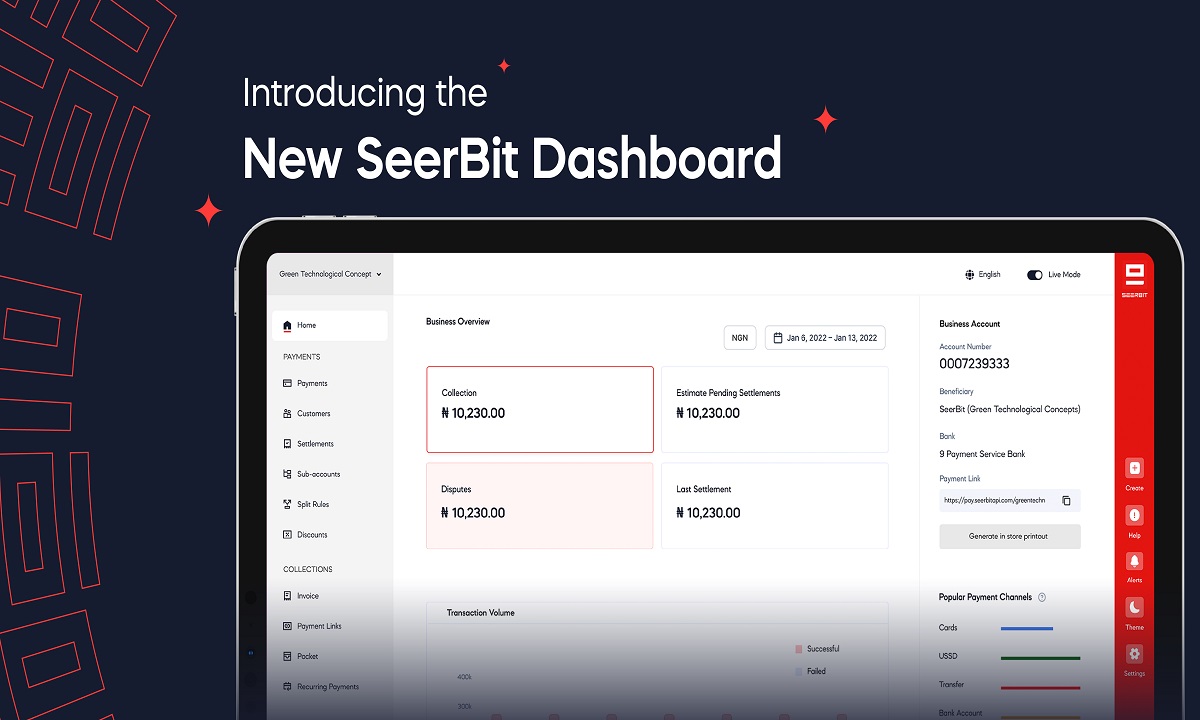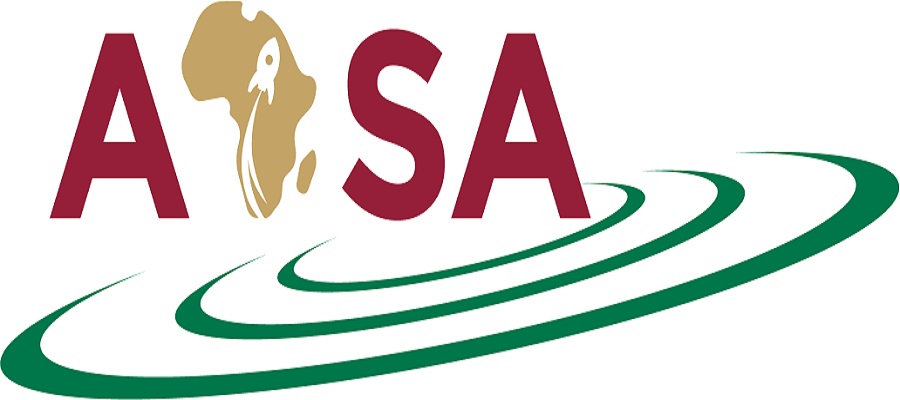Telecom
SeerBit New Merchant Dashboard: A Game-Changer for Business Efficiency

In today’s competitive marketplace, businesses need advanced tools to drive operational efficiency and fuel growth. SeerBit, a leading Pan-African payment company, is addressing these needs with the launch of its new, feature-rich merchant dashboard, set to go live on October 1, 2024.

Omoniyi Kolade, CEO of SeerBit
Designed for simplicity and ease of use, the revamped dashboard offers enhanced features, robust analytics, and an improved user interface, transforming how businesses manage transactions and streamline operations for growth.
‘‘We are excited to announce the launch of our latest innovation—the Merchant Portal Version 3.0, going live on October 1, 2024,’’ disclosed Babajide Shoyebo, Senior Product Manager at SeerBit.
‘‘The Merchant Portal Version 3.0 — accessible via https://dashboardv3.seerbit.com — is the latest evolution of our platform, specifically engineered to provide merchants with state-of-the-art tools and features that enhance operational efficiency, user engagement and overall business performance. This version represents our commitment to innovation and excellence, equipping merchants with everything they need to succeed in a competitive marketplace. Whether you’re a merchant in the e-commerce business, travel and hospitality, healthcare, digital services, financial services, or even in the education sector, this new portal is designed to meet the needs of users across diverse industries and help you achieve seamless business management.’’
Below is an overview of what to expect from the new SeerBit merchant dashboard, including some of the game-changing features and benefits for businesses.
A Modern, User-Friendly Interface
Ease of use is central to the redesign of the new merchant dashboard. Navigating through the portal is quicker, smoother and more intuitive than ever before. The platform is designed to ensure that everything is accessible with just a few clicks. This intuitive design ensures that both tech-savvy users and those less familiar with digital tools can maximise the portal’s full potential. Users can view all transactions, manage customer accounts and stay on top of settlements – without a steep learning curve. The improved layout makes it easier to access key features like transaction reports, customer management, settlement reports, refund processing, and invoicing, enabling merchants to focus on what truly matters—running their businesses.
Powerful New Features to Drive Your Business Forward
In addition to existing features, such as seamless onboarding, transaction reports, dispute reports, payment link and recurring payment, etc., this latest release introduces two highly anticipated features – Split Settlement and Invoicing. These tools are designed to simplify financial management, improve operational efficiency, and offer users greater flexibility in handling complex transactions.
a. Split Settlement: Flexibility for Complex Transactions
The split settlement feature allows you to divide a single payment between multiple accounts without having to manually calculate or handle the split, reducing the risk of errors and improving transparency. This is a game-changer for businesses that work with multiple stakeholders or sub-merchants. For example, marketplaces or businesses with commission structures can easily allocate incoming payments to different parties.
Imagine running an online marketplace where sellers, service providers, and platform fees all need to be handled within a single transaction. Split settlement simplifies this process, allowing you to decide how payments should be distributed across the board. This provides you with more control over your finances, while also saving valuable time that would otherwise be spent on manual reconciliation. The automated process ensures transparency and accuracy, giving merchants full visibility into how funds are distributed, helping businesses avoid bottlenecks and delays in processing.
b. Invoicing: Streamline Your Billing Process
Managing invoices can be a time-consuming task for businesses, particularly those handling multiple clients and transactions. The invoicing feature simplifies this process by enabling merchants to effortlessly create, send and track invoices directly from the dashboard. With just a few clicks, you can generate professional invoices with detailed breakdowns, including customer information and payment details, ready to be shared with your clients—ensuring timely and hassle-free payments.
Each invoice is embedded with a payment link, allowing customers to make payments instantly. This eliminates the need for manual payment collection or time-consuming follow-up communication. You’ll also receive real-time notifications as payments are made, keeping you informed without the need to chase clients or manually monitor your accounts. Your complete transaction history is stored on the platform, enabling you to track each invoice and effectively manage your finances.
For service-based businesses such as freelancers and consultants, invoicing has never been easier. The automation reduces administrative tasks, freeing up more time to focus on growing your business. It also improves cash flow by enabling faster payment turnaround and minimising the risk of payment delays.
Why This Matters: Empowering Businesses for Growth
Further expounding the benefits of the new rollout, Shoyebo said: ‘‘At SeerBit, we believe that merchants need more than just a platform for transactions—they need a comprehensive business management tool.
‘‘Merchant Portal Version 3.0 does just that by offering enhanced flexibility, control and visibility into your day-to-day operations. The introduction of invoice and split settlement represents our commitment to helping businesses streamline payment processes, reduce operational costs and improve customer satisfaction. These new features are not just about making transactions easier—they’re about empowering merchants to grow,” he stated.
The new SeerBit merchant dashboard is live from October 1, 2024 and is accessible at https://dashboardv3.seerbit.com.
Telecom
MTN Nigeria Drags 20 Banks to Court over N6Bn Debt by SleekChip

MTN Nigeria has taken legal action against more than 20 banks as it intensifies efforts to recover nearly ₦6 billion in interconnect debt from SleekChip Technologies Limited, a licensed international direct access and transit service provider.

Karl Toriola, chief executive officer, MTN Nigeria
This move comes on the back of a court judgment awarding the telecom giant the right to reclaim funds owed through garnishee proceedings.
The Federal High Court in Abuja, presided over by Justice Peter Lifu, ruled in November 2024 that SleekChip must pay MTN $1.97 million—or its naira equivalent at the Central Bank of Nigeria’s official rate at the time.
The court also granted interest on the debt at a rate 2% above the Nigerian Interbank Offer Rate, backdated to January 31, 2022, until full repayment is made.
At the heart of the dispute lies a 2019 interconnection agreement between MTN and SleekChip, which permitted the exchange of calls and messages between their networks.
MTN alleged that from January to October 2022, SleekChip accumulated significant unpaid charges.
Despite repeated demand notices and a formal acknowledgment of debt by SleekChip in May 2023, no repayment was made.
With the judgment in hand, MTN has proceeded to enforce it by seeking court orders to freeze and seize SleekChip’s funds held across Nigerian banks.
The telecom operator pegged the naira value of the judgment debt at over ₦3.28 billion based on the exchange rate of ₦1,665.84 to the dollar as of November 7, 2024, with interest claims pushing the amount beyond ₦5 billion.
Court records show that on May 16, 2025, representatives from MTN and several banks appeared before Justice Lifu.
MTN submitted that most banks had filed affidavits disclosing the status of any accounts held by SleekChip.
The court subsequently discharged over 10 banks that confirmed they had no financial ties to the debtor.
Some banks raised objections to MTN’s request to extend searches using the debtor’s BVN, arguing that the court had issued no such order. The court has scheduled the next hearing for June 26, 2025, to continue the garnishee proceedings.
This case adds to a growing list of MTN’s debt recovery efforts across Nigeria’s telecom sector. In 2023, the Nigerian Communications Commission (NCC) approved MTN’s request to disconnect several service providers over similar unpaid interconnect charges—including SleekChip and Exchange Telecommunications.
The ongoing legal enforcement signals MTN’s strategic shift toward reclaiming debts through court-backed recovery rather than relying solely on regulatory pressure.
With mounting operational costs and network expansion demands, telecom operators are becoming less tolerant of defaults, especially in interconnect fee obligations.
Telecom
Africa Launches First Continental Space Agency

Africa has launched its first continental space agency to enhance Earth observation and data sharing at a time when a more challenging global environment is restricting access to climate and weather information.

The African Space Agency was inaugurated last month under the African Union’s umbrella and is based in Cairo.
Currently in the process of establishment and recruiting key personnel, the agency will oversee coordination of existing national space programs.
Its goal is to strengthen the continent’s space infrastructure by deploying satellites, installing weather stations, and ensuring data sharing across Africa and beyond.
“Space activities across the continent have been very fragmented,” explained Meshack Kinyua, a space engineer and experienced African space policy expert who now leads capacity-building at the agency.
“The African Space Agency introduces a coordination framework and economies of scale — it places all African Union members on an equal footing regarding access to gathered data based on their needs.”
Africa is the poorest continent globally, and its people are among the most vulnerable to extreme weather events worsened by climate change, despite contributing far less to global warming than those in developed nations.
The absence of high-resolution weather and climate data hinders governments from warning citizens about approaching extreme weather, and scientists cannot accurately forecast long-term trends because their models lack detailed data.
The African Space Agency represents a move toward changing this, Kinyua said.
The agency also seeks to expand some successful projects across the continent, such as early warning systems for fishermen in West Africa and the Congo River Basin, he added.
Though long planned, the agency’s launch comes shortly after the Trump administration dismantled the US Agency for International Development (USAID), which had been a major funder of various programs in Africa.
When 80% of USAID’s projects were canceled, initiatives like SERVIR—a joint effort by USAID, NASA, and space organizations in developing countries to address climate change, food security, and natural disasters—were among those affected.
“We need to ensure that African satellites can improve measurements and fill data gaps,” Kinyua stated.
“These gaps will always exist, so we must fill some ourselves and collaborate with other agencies.”
The African agency has already partnered with the European Space Agency to train experts and exchange knowledge, including in data processing and satellite construction.
In Europe, national space agencies share the costs of launching new Earth observation satellites, which can reach up to €800 million ($897 million), said Benjamin Koetz, head of the long-term action section at the European Space Agency. Countries also share the data gathered by these satellites.
“Not every country needs to invest in and build the same satellite,” Koetz explained.
Cairo launched Africa’s first satellite in 1998, and since then, over 20 African nations have established their own space agencies.
Eighteen of these countries have launched a combined total of 63 satellites.
The African Union plans to fund the African Space Agency on a project-by-project basis.
“Securing financial resources is a challenge because there is so much to accomplish, and our resources are limited,” Kinyua explained.
“However, we must take small steps before we can start running.”
Africa’s early space leaders — including Nigeria, Egypt, and South Africa — took a considerable amount of time to establish their agencies and become operational because they had to begin from the ground up, noted Danielle Wood, an associate professor and director of the Space Enabled Research Group at the Massachusetts Institute of Technology.
“It shouldn’t take that long anymore since many African countries now have space experience, and ideally, new countries can learn from existing examples and collaborate to move faster,” she added. “While other players like the US and Europe will pursue their own interests, the African Space Agency will remain focused on Africa, so it should support every country on the continent.”
Telecom
Minister Decries High Rate of Nigerian Women Access Gap to Smartphones

Bosun Tijani, Minister of Communications, Innovation and Digital Economy, has revealed that at least 68% of Nigerian women lack access to smartphones, a barrier that limits their participation in the digital economy and access to essential online services.

Tijani revealed this during a press briefing in Abuja to mark the 2025 World Telecommunication and Information Society Day (WTISD), observed every year on May 17th.
Represented by Adeyemo Olugbenga, Director of the National Frequency Management Council Secretariat, Tijani emphasised that as Nigeria fast-tracks its digital transformation, it remains committed to inclusivity, ensuring that no one, particularly women and girls, is left behind.
The Minister reaffirmed the government’s commitment to equipping 70% of Nigerian women and girls with advanced digital skills by 2027.
He also revealed that the government is collaborating with the African Development Bank (AfDB), the World Bank, and private investors to offer grants and low-interest loans to women-led tech startups, supporting inclusive growth in the digital sector.
Represented by Adeyemo Olugbenga, Director of the National Frequency Management Council Secretariat, Tijani emphasised that the digital revolution can only be truly transformative if it is inclusive.
He stressed the importance of building a future where gender equality is not just an aspiration but a lived reality.
While acknowledging Nigeria’s progress in achieving 46.2% broadband penetration, he noted that the digital economy goes beyond infrastructure and innovation; it is ultimately about people.
He warned that when half the population continues to face barriers to access, skills, and leadership in technology, the nation is not only failing its women but also undermining its overall potential.
The Minister emphasized that achieving gender equality in the digital age cannot rest solely on the shoulders of government.
He urged the private sector to play a pivotal role by adopting gender-responsive hiring practices, investing in women-led tech hubs, and implementing workplace policies that empower women.
Highlighting the government’s commitment to inclusive digital growth, he noted that the ministry has launched several key programmes and initiatives aimed at fostering broad-based participation in the digital economy.
Among these is the National Gender Digital Inclusion Strategy (NGDIS) 2004–2077, designed to create safe online spaces for women and support their advancement in technology-driven sectors.
In terms of skills development, the minister pointed to the expansion of impactful programmes such as the 3 Million Technical Talents (MTT) initiative, the Nigeria Artificial Intelligence Research Scheme, Digital Nigeria, and efforts to strengthen local content and capacity.
Recognising the growing need for online safety, he added that the ministry is actively enhancing cybersecurity and anti-harassment frameworks to better protect women in digital spaces.
He also stressed the importance of challenging gender stereotypes by encouraging young girls to pursue Science, Technology, Engineering, and Mathematics (STEM) education from an early age.
Tijanii called on civil society organisations and the media to amplify the achievements of women in tech and hold decision-makers accountable for inclusive policy implementation.
Speaking on the theme of this year’s World Telecommunication and Information Society Day, “Gender Equality in Digital Transformation,” the minister described it as both timely and essential.
He warned that when women and girls are excluded from accessing technology, acquiring digital skills, or leading in tech sectors, it is not just their potential that is stifled—but the world’s.
The minister reaffirmed the significance of WTISD, which serves as a platform to raise global awareness about the transformative power of ICTs.
He noted that digital innovation, such as leveraging artificial intelligence to combat climate change and eradicate poverty, holds immense promise in addressing some of the world’s most urgent challenges.

 E-Financial2 days ago
E-Financial2 days agoAccess Holdings Sets Benchmark in Fraud Prevention With ₦193.5Bn Tech Investment

 E-Financial2 days ago
E-Financial2 days agoMTN’s Digital Lending Arm Disburses $592m Loans in Q1

 E-Financial2 days ago
E-Financial2 days agoAccess Bank, Deloitte Partner to Equip SMEs with Tools for Growth

 News2 days ago
News2 days agoSERAP Asks Ojulari, NNPC CEO to Account for Missing N500Bn or Face Legal Action

 E-Financial2 days ago
E-Financial2 days agoFG Verifies 2m Households for Cash Transfer

 E-Business2 days ago
E-Business2 days agoFG Launches Online Citizenship, Business Management Platform

 Telecom2 days ago
Telecom2 days agoEquinix Expands Digital Footprint in Nigeria with Launch of LG2.3 Data Center

 General News2 days ago
General News2 days agoNOTAP Urges South Eastern Entrepreneurs to Embrace Franchising as Business Model




























